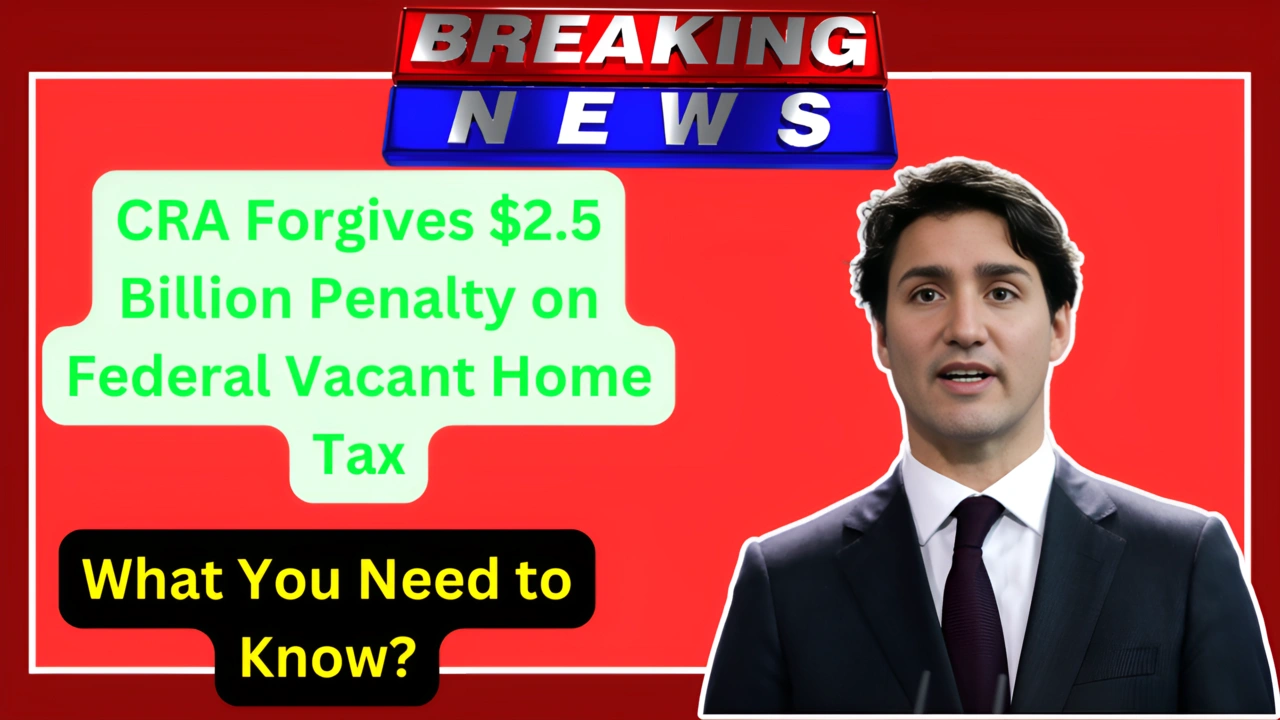CRA Forgives $2.5 Billion Penalty on Federal Vacant Home Tax: The Canada Revenue Agency (CRA) has recently waived a staggering $2.5 billion in penalties and interest related to the Underused Housing Tax (UHT), drawing attention to the challenges faced in its implementation. This waiver amount far exceeds the $49 million in revenue collected from the tax during the 2023-24 fiscal year, prompting widespread debate about the tax’s complexity and its unintended consequences.
What is the Underused Housing Tax (UHT)?
Introduced in 2022, the UHT is a 1% annual tax imposed on vacant or underused residential properties owned by foreign nationals. The tax has two primary goals:
- Discourage foreign ownership of empty properties: To reduce the number of homes sitting vacant in Canada, especially in cities facing housing shortages.
- Fund housing initiatives: Generate revenue that can be reinvested into programs aimed at increasing the availability of housing.
The Waiver of $2.5 Billion: Why It Happened
The CRA’s decision to waive $2.5 billion in penalties and interest primarily affects the 2022 tax year. This figure sheds light on the significant confusion that surrounded the UHT. The agency issued more than 531,000 waivers, with an average of $4,600 per waiver. These waivers were primarily granted for late filings that resulted from unclear rules.
Many Canadians and corporations, unaware that they fell under the tax’s reporting requirements, were hit with hefty fines. Many of these filers were not even liable for the tax itself but were penalized due to mistakes in the filing process.
Key Figures on UHT and Waivers
| Category | Details |
|---|---|
| Total Waived Penalties & Interest | $2.5 billion |
| Average Waiver Amount | $4,600 |
| Total Waivers Issued | 531,000 |
| Revenue Collected (2023-24) | $49 million |
| Implementation Costs | $59 million (2022-2024) |
| Advertising Costs | $900,000 |
Initial Issues with the UHT’s Implementation
The UHT has been controversial from the start, largely due to its complicated reporting requirements. Some of the key issues included:
- Reporting for Bare Trusts: Many Canadians, like parents who co-signed mortgages for their children, were considered part of a “bare trust,” which meant they had to file returns to claim exemptions.
- Partnerships: Couples who jointly owned properties were treated as partnerships, subject to the same reporting obligations.
These complexities led to confusion among Canadian homeowners and corporations, many of whom did not realize they were required to report, even if they were not liable for the tax itself.
Steep Penalties for Non-Compliance
Under the original design, penalties for non-compliance were severe:
- Individuals: Fines began at $5,000.
- Corporations: Fines started at $10,000.
These penalties were later reduced to more manageable amounts:
- Individuals: Reduced to $1,000.
- Corporations: Reduced to $2,000.
Relief Measures from the CRA
To ease the burden on taxpayers, the CRA took several steps:
- Extended Deadlines: The filing deadline for 2022 UHT returns was extended twice. The final deadline was set for April 30, 2024.
- Waivers Issued: Penalties and interest were waived for taxpayers who filed by the final extended deadline.
Revenue vs. Administrative Costs
Despite the $2.5 billion in waived penalties, the revenue collected from the UHT in 2023-24 was only $49 million. Furthermore, administrative costs for implementing the tax reached $59 million, with an additional $900,000 spent on public awareness campaigns. These figures raise questions about the tax’s overall effectiveness.
Impact on Canadians and Foreign Owners
While the UHT was designed to target foreign property owners, the significant number of waivers indicates that Canadian taxpayers were also significantly impacted. This highlights the need for better communication and clearer guidelines for compliance.
The Future of the UHT
In response to these challenges, the CRA has revised the UHT rules for Canadian homeowners and corporations starting in the 2023 tax year. These changes aim to simplify the compliance process and reduce administrative burdens. However, the broader debate about the tax’s effectiveness in addressing housing issues continues.
The CRA’s decision to waive $2.5 billion in penalties underscores the tax’s initial design flaws and the unintended consequences it had for both Canadian and foreign property owners. Going forward, clearer guidelines and more efficient processes will hopefully lead to a fairer and more successful implementation of the tax.
FAQs
What is the Underused Housing Tax (UHT)?
The UHT is a 1% annual tax on vacant or underused residential properties owned by foreign nationals, designed to address housing shortages in Canada.
Why did the CRA waive $2.5 billion in penalties?
The penalties were waived due to widespread confusion caused by unclear reporting requirements, which led to many Canadians mistakenly being subject to the tax’s obligations.
How much revenue did the UHT generate in 2023-24?
The UHT generated $49 million in revenue during the 2023-24 fiscal year.



